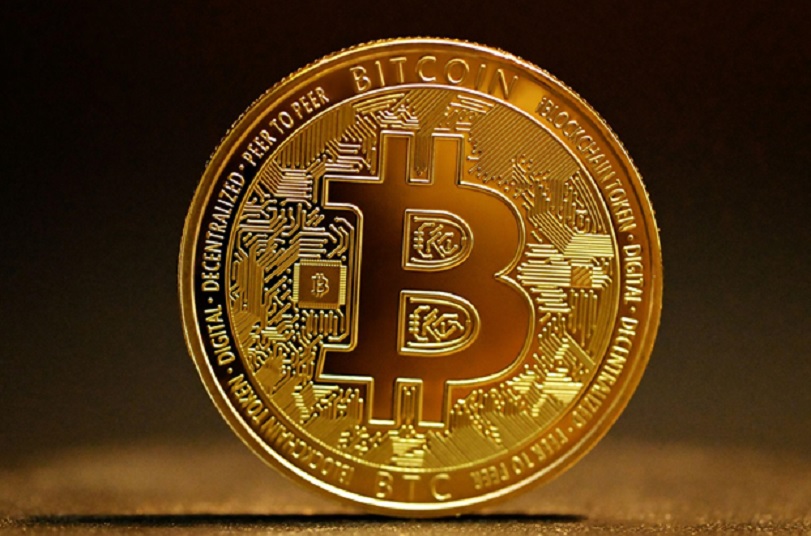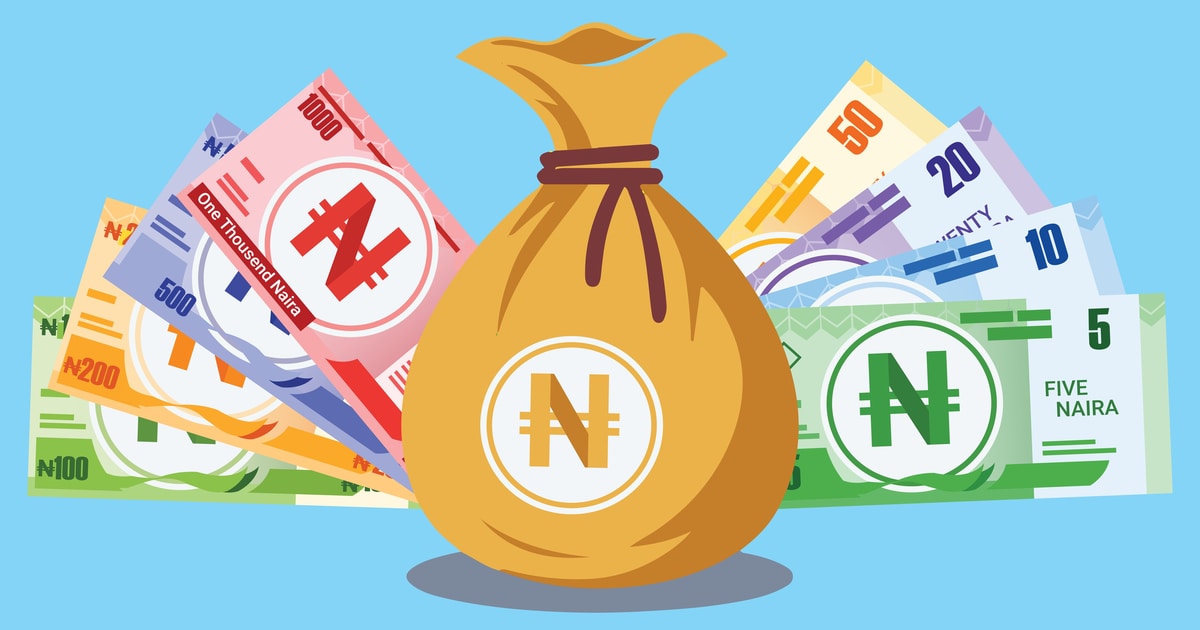Economy
Top 3 Bitcoin DeFi Platforms You Should Check Out

Bitcoin DeFi is a relatively new concept that leverages Bitcoin layers and smart contracts to build decentralized financial applications. These DeFi platforms offer a variety of financial services, including lending, borrowing, trading, and more.
Unlike traditional finance, Bitcoin DeFi operates on a decentralized network, eliminating the need for banks, brokers, and other centralized institutions, while allowing anyone with an internet connection and a digital wallet to participate in the crypto markets.
3 Leading DeFi Platforms Built on Bitcoin
Bitcoin doesn’t natively support smart contracts, but layer 2 solutions like Rootstock (RSK), Build on Bitcoin (BoB), and Stacks bring smart contract capabilities to Bitcoin.
These platforms integrate Bitcoin’s robust security with the flexibility of decentralized applications (dApps), enabling DeFi functionality like those found on Ethereum. This enables consumers to access services like lending, borrowing, and trading. They can even buy runes tokens and other new tokens built on Bitcoin through these platforms.
While DeFi platforms built on Bitcoin perform different functions based on why the platform was built, they fill vital consumer needs or gaps in the ecosystem.
Let’s look at the three leading Bitcoin DeFi platforms to see what the market leaders in the ecosystem have to offer.
Sovryn
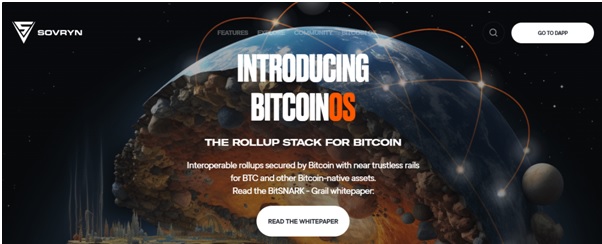
Sovryn is a decentralized finance platform built on Rootstock (RSK) and Build on Bitcoin (BoB). The platform provides a broad suite of DeFi services to Bitcoin users, empowering them to trade, earn interest, and access liquidity using BTC directly.
Sovryn offers users several core DeFi services, including:
- Decentralized trading: Sovryn supports decentralized spot and margin trading. Users can trade directly from their wallets with no need for intermediaries, maintaining full control of their assets.
- Lending and borrowing: Sovryn allows Bitcoin holders to earn interest by lending their BTC or borrowing funds using BTC as collateral. The lending protocol operates in a decentralized manner, meaning the platform acts as a facilitator but not a custodian.
- Liquidity provision: Users can provide liquidity to Sovryn’s decentralized exchange and earn rewards, typically in the form of trading fees or the platform’s native token, SOV.
- Staking: Sovyrn users can also earn staking rewards by depositing SOV.
Pros
- Offers a wide range of decentralized financial services
- Leverages Bitcoin’s security, making it less vulnerable to attacks
- Non-custodial, so users retain control of their private keys and assets
Cons
- Might be complex for new users
ALEX
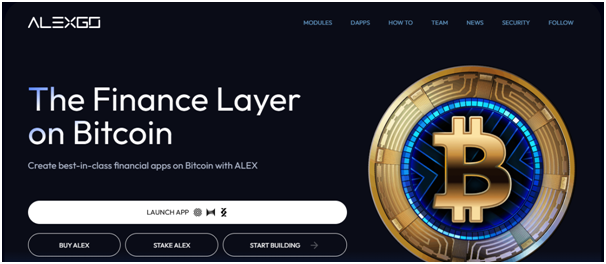
ALEX is a DeFi platform built on the Stacks blockchain, a layer 2 protocol that connects to Bitcoin. ALEX seeks to build a comprehensive DeFi ecosystem where users can trade, lend, and borrow Bitcoin-based assets on Stacks.
The platform’s DeFi services include:
- Decentralized trading: ALEX offers a decentralized exchange (DEX) allowing permissionless trading of Bitcoin-backed assets, including stablecoins and other cryptocurrencies. The platform supports spot trading with a focus on maintaining liquidity for Bitcoin users.
- Lending and borrowing: Through ALEX, users can lend assets to earn interest or borrow against their Bitcoin holdings. These decentralized lending services are a key feature for users who want to access liquidity without selling their BTC.
- Yield farming and staking: ALEX provides opportunities for yield generation, where users can earn rewards by staking assets and providing liquidity to the platform’s pools.
Pros
- Supports a wider range of tokens than other Bitcoin DeFi platforms
- Benefits from an increasingly integrated ecosystem as Stacks keeps developing
Cons
- Relatively slower than other networks, impacting trading speeds and overall user experience
- Complex for new users
Velar
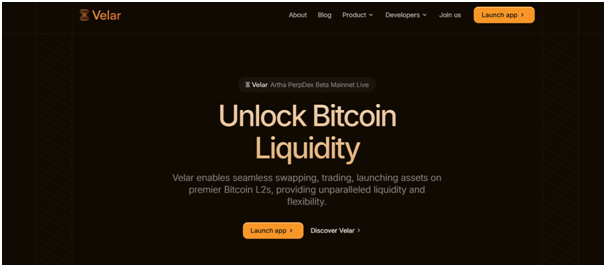
Velar is a newcomer to the Bitcoin DeFi scene, aiming to bring advanced decentralized finance functionality to Bitcoin users in a seamless and scalable way.
Built on Stacks, Velar offers decentralized trading, token launches and more.
Velar’s key features include:
- Decentralized lending and borrowing: Velar’s primary focus is providing efficient lending and borrowing services for bitcoin and other assets. Users can lock up their bitcoin to borrow other assets or lend out bitcoin to earn interest.
- Synthetic asset creation: Velar also enables the creation of synthetic assets, which are tokenized versions of real-world assets that track the value of their physical counterparts. This feature allows users to gain exposure to traditional markets while operating within a decentralized Bitcoin DeFi ecosystem.
- Liquidity pools: Like other DeFi platforms, Velar allows users to provide liquidity to decentralized pools and earn rewards.
Pros
- Synthetic assets on the platform offer more diverse ways to interact with the platform and manage their portfolios
- Benefits from Bitcoin’s security while maintaining faster transaction speeds than the Bitcoin base layer.
- User-friendly interface making DeFi services accessible even to new users
Cons
- Lower liquidity compared to more established DeFi platforms
- May be too complex for new users
Wrapping Up
Bitcoin DeFi is still in its early stages, but platforms like Sovryn, ALEX, and Velar are proving that decentralized financial services can thrive on Bitcoin.
Whether you’re looking for non-custodial trading, decentralized lending, or even exposure to synthetic assets, each of these platforms brings something unique to the table.
Whether you’re a long-time Bitcoin holder or new to DeFi, these platforms are worth exploring as you dive into the future of decentralized finance on Bitcoin.
Economy
Stock Market Gains N2.367trn as All-Share Index Rises 2.06%

By Dipo Olowookere
The Nigerian Exchange (NGX) Limited appreciated by 2.06 per cent on Friday, amid a rush for local equities due to encouraging earnings of companies for 2025.
Business Post reports that the buying pressure was across the key sectors of Customs Street yesterday, with the banking index growing by 2.49 per cent. The energy industry appreciated by 2.05 per cent, the consumer goods counter grew by 0.78 per cent, the insurance space improved by 0.64 per cent, and the industrial goods sector expanded by 0.44 per cent.
At the close of trades, the market capitalisation went up by N2.367 trillion to N117.027 trillion from N114.660 trillion, and the All-Share Index (ASI) gained 3,687.45 points to close at 182,313.08 points compared with the previous day’s 178,625.63 points.
Cornerstone Insurance, Infinity Trust, and Nestle Nigeria appreciated by 10.00 per cent each to sell at N6.38, N9.90 and N2,662.00, respectively, while Okomu Oil rose by 9.99 per cent to N1,327.00, with RT Briscoe up by 9.97 per cent to N17.42.
Conversely, SAHCO depleted by 10.00 per cent to M135.00, Guinness Nigeria lost 9.97 per cent to trade at N103.00, Omatek shrank by 9.39 per cent to N2.99, NPF Microfinance Bank decreased by 6.51 per cent to N5.60, and eTranzact slipped by 6.33 per cent to N10.80.
A total of 53 stocks ended in the green side and 33 stocks finished in the red side, representing a positive market breadth index and strong investor sentiment.
Data showed that 936.4 million shares valued at N52.7 billion were transacted in 50,068 deals on Friday versus the 698.3 million shares worth N28.438 billion traded in 50,886 deals on Thursday, indicating a rise in the trading volume and value by 34.10 per cent, and 85.56 per cent apiece, and a slip in the number of deals by 1.61 per cent.
First Holdco closed the session as the most active equity with 106.3 million units worth N5.1 billion, Zenith Bank transacted 72.6 million units valued at N5.7 billion, United Capital traded 45.4 million units for N963.2 million, GTCO sold 45.0 million units worth N4.9 billion, and Fidelity Bank exchanged 31.4 million units valued at N639.0 million.
Economy
OTC Securities Exchange Extends Positive Run by 0.86%

By Adedapo Adesanya
The NASD Over-the-Counter (OTC) Securities Exchange rose further by 0.86 per cent on Friday, February 13, with the market capitalisation growing by N20.27 billion to N2.378 trillion from the previous session’s N2.357 trillion, and the NASD Unlisted Security Index (NSI) rising by 33.87 points to 3,974.77 points from the 3,940.90 points it ended a day earlier.
The improvement recorded by the bourse yesterday was influenced by six price gainers led by Okitipupa Plc, which went up by N18.00 to sell at N260.00 per share compared with the previous day’s N242.00 per share.
Further, Central Securities Clearing System (CSCS) Plc added N3.39 to quote at N80.47 per unit versus N77.08 per unit, IPWA Plc chalked by 31 Kobo to finish at N3.44 per share versus N3.13 per share, Lagos Building Investment Company (LBIC) Plc gained 31 Kobo to settle at N3.41 per unit versus N3.10 per unit, Afriland Properties Plc appreciated by 31 Kobo to N16.51 per share from N16.20 per share, and Food Concepts Plc increased by 8 Kobo to N3.28 per unit from N3.20 per unit.
There were three price losers, led by MRS Oil Plc, which weakened by N10.00 to close at N170.00 per share compared with Thursday’s price of N200.00 per share, FrieslandCampina Wamco Nigeria Plc lost N2.59 to sell for N65.52 per unit compared with the preceding session’s N68.10 per unit, and Geo-Fluids Plc depreciated by 33 Kobo to N3.30 per share from N3.63 per share.
During the session, the volume of securities transacted by the market participants went up by 9.5 per cent to 9.4 million units from 8.6 million units, the value increased by 1,206.5 per cent to N703.6 million from N53.9 million, and the number of deals grew by 7.1 per cent to 45 deals from 42 deals.
CSCS Plc remained the most traded stock by value (year-to-date) with 27.1 million units exchanged for N1.5 billion, followed by Resourcery Plc with 1.05 billion units traded at N408.6 million, and Geo-Fluids Plc with 29.9 million units valued at N152.6 million.
Resourcery Plc ended the day as the most traded stock by volume (year-to-date) with 1.05 billion units sold for N408.6 million, followed by Geo-Fluids Plc with 29.9 million worth N152.6 million, and CSCS Plc with 27.1 million units sold for N1.5 billion.
Economy
Naira Value Further Dips 0.13% to N1,355/$1

By Adedapo Adesanya
The Naira depreciated further against the United States Dollar by N1.76 or 0.13 per cent on Friday in the Nigerian Autonomous Foreign Exchange Market (NAFEX) to close at N1,33.42/$1, in contrast to the N1,353.66/$1 it was exchanged a day earlier.
However, the Naira appreciated against the Pound Sterling in the same market window yesterday by N5.05 to trade at N1,844.59 versus Thursday’s closing price of N1,849.64/£1, and against the Euro, it improved by 75 Kobo to quote at N1,60/€1 versus the previous day’s N1,608.68/€1.
At the GTBank FX desk, the domestic currency lost N6 on the US Dollar on Friday to settle at N1,365/$1 versus the preceding session’s N1,359/$1, and at the parallel market, it chalked up N10 to trade at N1,430/$1 versus the previous day’s N1,430/$1.
The weakening of the Nigerian currency in the official market happened as the Central Bank of Nigeria (CBN) refrained from intervening in the official window.
The FX supply side was eclipsed by growing demand for foreign payments. Exporters’ inflows, non-bank corporate supply, and other market participants’ contributions had enhanced the FX liquidity level.
Pressure came with the entry of all duly licensed Bureau De Change (BDCs) into the official foreign exchange, although there are indications that the move will help the Naira-US Dollar exchange value, as BDC operators have started approaching their banks to understand the operational modalities and framework for accessing Dollars.
As for the cryptocurrency market, benchmarked tokens improved as US interest rate futures on Friday raised odds of rate cuts by the Federal Reserve after a report that showed inflation rose less than expected in January.
Data showed the Consumer Price Index (CPI) rose 0.2 per cent last month after an unrevised 0.3 per cent gain in December, with Solana (SOL) up by 7.9 per cent to $85.17, and Ethereum (ETH) up by 6.5 per cent to trade at $2,059.78.
Further, Cardano (ADA) added 5.3 per cent to close at $0.2758, Ripple (XRP) jumped 5.1 per cent to $1.42, Bitcoin expanded by 4.8 per cent to $69,357.35, Litecoin (LTC) grew by 4.7 per cent to $55.27, Binance Coin (BNB) jumped 4.0 per cent to $621.88, and Dogecoin (DOGE) increased by 3.8 per cent to $0.0965, while the US Dollar Tether (USDT) and the US Dollar Coin (USDC) remained unchanged at $1.00 each.
-

 Feature/OPED6 years ago
Feature/OPED6 years agoDavos was Different this year
-
Travel/Tourism10 years ago
Lagos Seals Western Lodge Hotel In Ikorodu
-

 Showbiz3 years ago
Showbiz3 years agoEstranged Lover Releases Videos of Empress Njamah Bathing
-

 Banking8 years ago
Banking8 years agoSort Codes of GTBank Branches in Nigeria
-

 Economy3 years ago
Economy3 years agoSubsidy Removal: CNG at N130 Per Litre Cheaper Than Petrol—IPMAN
-

 Banking3 years ago
Banking3 years agoSort Codes of UBA Branches in Nigeria
-

 Banking3 years ago
Banking3 years agoFirst Bank Announces Planned Downtime
-

 Sports3 years ago
Sports3 years agoHighest Paid Nigerian Footballer – How Much Do Nigerian Footballers Earn






